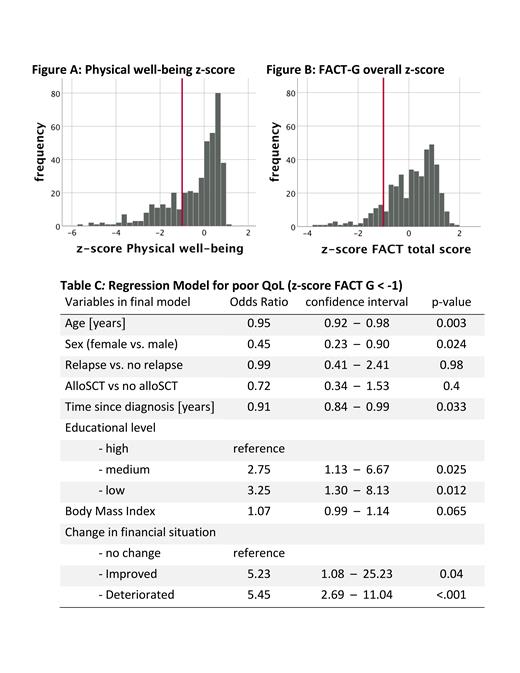Abstract
Introduction
An increasing proportion of patients with Acute Myeloid Leukemia (AML) become long-term survivors. Somatic and psycho-social outcomes are therefore becoming increasingly important, but little is known about the long-term effects of the disease and its treatment.
Methods
We designed a comprehensive analysis of AML survivorship outcomes including psycho-social well-being and somatic health status and conducted a questionnaire-based study collecting data from AML long term survivors (AML-LTS) and their physicians. This report focuses on overall and health-related quality of life. Somatic, especially cardiovascular, morbidity in AML-LTS are reported separately (Moret et al.). The primary aim of this study was to compare quality of life (QoL, measured by the FACT-G questionnaire) and general and health-related life satisfaction (gLS/hLS, measured by the FLZ-M questionnaire) of AML-LTS with normative data of German adults who were not diagnosed with AML (Holzner et al. 2009; Daig et al. 2009). FLZ-M and FACT-G scores were standardized relative to the normal population mean and standard deviation, stratified by sex and age. These z-scores were then tested against the fixed value 0 (indicating no difference between AML-LTS and the general population) using Mann-Whitney U-tests. Our statistical design incorporated a sequentially rejective testing procedure to maintain the multiple testing significance level at 5%, using a graphical model as described by Bretz et al. (2009).
Results
427 former AML patients who had been enrolled in AMLCG trials (AMLCG-1999, AMLCG-2004, AMLCG-2008) or the AMLCG patient registry, participated in this study between 5 and 18.6 years [y] after their initial AML diagnosis (median, 11.3y). Median age of AML-LTS was 61y (range 28y-93y), and 56% were female. Thirty-eight percent of participants had been treated with chemotherapy alone, while 62% received at least one allogeneic stem cell transplant (alloSCT). A relapse occurred in 24% of the participants.
Unexpectedly, quality of life and general life satisfaction summary scores were significantly higher in AML-LTS (p<.001) compared to adults without the diagnosis of AML, although most differences on QoL subscales relative to the general population were small and very likely not clinically relevant. No statistical difference between AML-LTS and normal adults was found for health-related life satisfaction (hLS).
Notably, a subgroup of participants (26%) reported poor physical well-being (PWB), indicated by a FACT PWB subscore more than one standard deviation (SD) below the age- and sex-matched general population value (Figure A). This resulted in poor overall QoL (i.e. >1 SD below normal) for 13% of the participants (Figure B).
To identify factors potentially associated with poor overall QoL, we constructed a logistic regression model including pre-specified cofactors (age, sex, time since initial diagnosis, relapse and alloSCT) and additional covariables that associated with QoL in univariate analyses (Table C). We found that participants with younger age, male sex, lower educational level, shorter time since diagnosis and a altered financial situation reported significantly lower QoL. No influence was found for other characteristics including treatment (alloSCT vs. no alloSCT), previous relapse, or de novo vs. secondary or therapy-related AML.
Discussion
Unlike previous studies of AML survivorship, our large cohort included a diverse spectrum of patients regarding age, time since diagnosis, and treatment modalities, which allows for new insight into long-term quality of life. Our study establishes that overall QoL in AML long-term survivors is comparable to the general population. Improvement of QoL continues beyond five years post diagnosis. Importantly, disease- and treatment-related factors, such as prior relapse or status post allogeneic transplantation, are not associated with overall QoL. However, we were able to identify risk factors for worse QoL (younger age, male sex, alteration of the financial situation), delineating a subgroup of patients that may still have a need for targeted psycho-social interventions five or more years after an AML diagnosis.
Berdel: Philogen S.p.A.: Consultancy, Current equity holder in publicly-traded company, Honoraria, Membership on an entity's Board of Directors or advisory committees. Hiddemann: Janssen: Research Funding; Roche: Membership on an entity's Board of Directors or advisory committees, Research Funding. Metzeler: AbbVie: Honoraria; Astellas: Honoraria; Daiichi Sankyo: Honoraria; Novartis: Consultancy; Jazz Pharmaceuticals: Consultancy; Pfizer: Consultancy; Celgene/BMS: Consultancy, Honoraria, Research Funding.


This feature is available to Subscribers Only
Sign In or Create an Account Close Modal